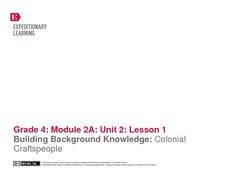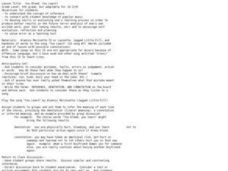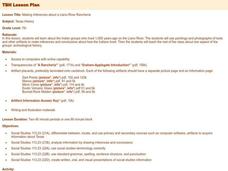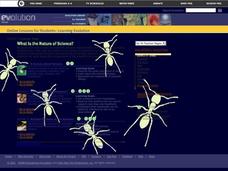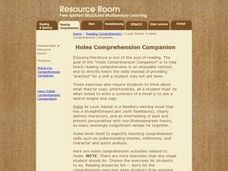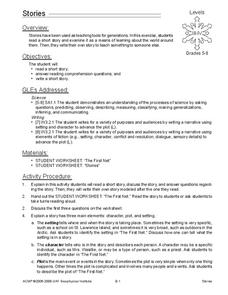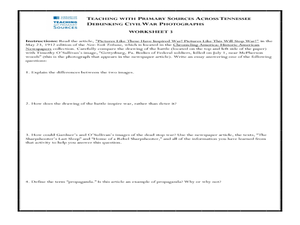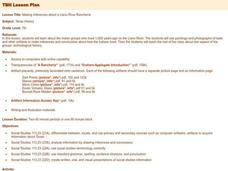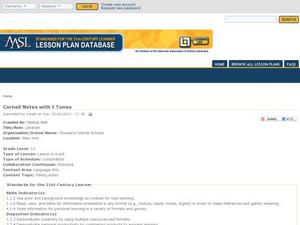EngageNY
Building Background Knowledge: Colonial Craftspeople
In the first lesson plan of this unit on colonial trade, fourth graders gain background knowledge of different jobs performed by early colonists. The class begins with a slide show presentation that includes a variety of great...
Curated OER
Teaching Inference with Trash and Mystery Objects
Students practice solving mysteries and using inference skills by digging through trash. In this problem solving lesson, students investigate groups of garbage to determine what type of person the garbage belonged to....
Curated OER
You Bleed, You Learn?
Jump back into the 90s with Alannis Morissette's song "You Learn." After hearing the song, small groups analyze the lyrics and write an essay about a mistake they've learned from. Use the example sentences to identify the denotative and...
Curated OER
Using Pre-reading Strategies: Infer
Use this resource to support your class practicing inference with poetry and visual art. The plan calls for an examination of "The Scream" by Edvard Munch and the "Mona Lisa" to promote speculation about artist's intent. From there, it...
EngageNY
Reading and Taking Notes on Colonial Trades
In the tenth instructional activity of this unit, young scholars learn to categorize information as they continue researching their colonial trade. During guided practice, the teacher models how to read informational text slowly while...
Curated OER
Making Inferences about a Llano River Rancheria
Seventh graders study the Indian groups who lived 1,000 years ago on the Llano River. They use paintings and photographs of tools and other artifacts to make inferences and conclusions about how the Indians lived.
NOAA
Journey to the Unknown
What's it like to be a deep-sea explorer? Tap into the imaginations of your fifth and sixth graders with a vivid instructional activity, the second part of a six-part adventure. Learners close their eyes and submerge themselves in an...
Curated OER
What is the Nature of Science?
Students examine videos of field researach to discover the components of the scientific process. Using forms, they conduct community surveys about the nature of science. They research the extinction of dinosaurs and compare...
Curated OER
The Diary of Anne Frank
Eighth graders read the Diary of Anne Frank. In this novel reading instructional activity, 8th graders read and analyze the story. Students do online activities and create a newspaper giving a summary of three major events in the story....
Curated OER
Holes Comprehension Companion
Here is a one-stop planning resource for Louis Sachar's Newbery Award-winning book Holes. You'll find 21 links to worksheets and various activities designed to span the entire book. Learners draw to help analyze settings and...
Curated OER
Not Just the Facts
Encourage your learners to explore the differences between hard news and news analysis. They outline a complex news analysis about the upcoming presidential election, then endeavor to write an analysis of the same topic, using local...
Curated OER
A Discourse on the History of Language
Analyze and make inferences from the information used by linguists to construct the evolution of languages. They research different dating techniques to explain how scientists infer age with evidence.
Curated OER
Stories
Young scholars read and write a short story. For this short story lesson plan, students read a short story and answer comprehension questions on it that teaches them about the world around them. Then they write a short story to...
Curated OER
Teaching with Primary Sources Across Tennessee: Debunking Civil War Photographs
Students analyze photographs and texts using primary source analysis. In this primary source lesson students determine whether the photographs and text are truthful.
Curated OER
Making Inferences About a Llano River Rancheria
Seventh graders research the Indian groups that lived 1,000 years ago on the Llano River. They analyze paintings and photographs of tools and artifacts, develop inferences and conclusions about how the Indians lived, and present the...
Curated OER
Teaching Imagery with Gary Paulsen
Young scholars read excerpts from memoirs written by Gary Paulsen as examples of how to write a narrative piece. They identify figurative language used and then they write a memoir of their own that contains imagery and figurative...
Curated OER
Cornell Notes with I Tunes
Note taking is an invaluable skill and requires practice. This instructional activity incorporates the Cornell Notes format, however the plan itself could be implemented to teach any style. The basic idea here is to use university...
College Board
Evaluating Sources: How Credible Are They?
How can learners evaluate research sources for authority, accuracy, and credibility? By completing readings, discussions, and graphic organizers, scholars learn how to properly evaluate sources to find credible information. Additionally,...
Curated OER
Do You Have a Sinking Feeling
Students determine how marine archaeologists use historical and archaeological data to draw inferences about shipwrecks. Students plot the position of a shipwrecked vessel, and draw inferences about the shipwreck from artifacts that have...
Curated OER
Shipwreck Mystery
Young scholars draw inferences about a shipwreck. In this marine archaeologist activity, students examine historical and archaeological data to draw inferences about the age and identity of shipwrecks.
Curated OER
Wreck Detectives
Students investigate shipwrecks. In this marine archaeology instructional activity ,students collect data and make inferences about the causes of shipwrecks. Students work in groups to create their own model of a shipwreck using clay....
Curated OER
Seeing Art in Historical Context: An Activity to Promote Visual Literacy
Students consider works of art in their historical context. In this art in historical context lesson, students are encouraged to think about and record their prior knowledge of the historical period and to make inferences about the...
Curated OER
Just Say No to Drugs
Students explore the dangers of drugs, drug awareness and abuse and different types of drugs. They demonstrate reading comprehension sills including inference, literal meaning and critical analysis.
Curated OER
Children's Book Creations
Students create a children's book version of the Japanese folk story "Momotaro Boy of the Peach" and present the story to elementary students. In this children's book lesson, students design their book to explain Japanese culture to...
Other popular searches
- Teaching Inference Skills
- Teaching Inference Reading
- Teaching Inference Implicit
- Teaching Inference 2nd
- Teaching Inference +Reading
